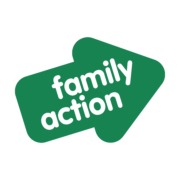With the current cost of living crisis following hot on the heels of the COVID pandemic, many families are struggling like never before. Here we share what we learnt speaking to members of staff and volunteers at our FamilyLine service, who never know what the next call will hold and work with people during some of their most challenging moments.
Some families never recovered from the pandemic
“We are seeing the impact of a couple of years… it started during COVID, and I think it’s actually starting to get a bit worse now for those who didn’t recover from that”.
“When I started during the pandemic it was quite common for parents to need grants for things like replacement bedding as they needed to keep children isolated, so they didn’t spread the virus to the rest of the family. We also saw a lot of requests for things like washing powder.
This year it’s more common that people say ‘I can’t feed the children’.
This year it’s more common that people say ‘I can’t feed the children’.
If you’re in that situation that impacts you, and you can break down. It’s just the worst thing to admit as a parent. But some callers are having to admit it, open their souls to us and say ‘I need help’”.
There isn’t always help available immediately.
“Often when we signpost people to other services who can help them it’s a case of saying ‘just hold on, there is a backlog, but they will help you’. It’s getting more desperate”.
Food banks are a lifeline … but they have their limits.
“For a lot of families food banks are becoming a social norm, and many rely on them as the cost of food goes through the roof.
I sometimes go down to one of the local soup kitchens and the demographic of people going there at night is so different than it was 18 months ago.
People complain that they’re not eligible for the food bank because they’ve got a job, but it doesn’t matter; people who are working are still finding it incredibly difficult to make ends meet.
We do see a lot of problems where people are given vouchers to use food banks by their local authority or Citizens’ Advice but they’re limited to providing support for three days or so.
“We do see a lot of problems where people are given vouchers to use food banks by their local authority or Citizens’ Advice but they’re limited to providing support for three days or so.”
That’s because food banks are meant to be short-term, emergency relief – but that isn’t long-term enough to help many families.
I’ve spoken to someone who had no food for herself over the weekend because she needed to feed a 6 year-old child so I’ve got nothing but sympathy for the people who run the foodbanks as I imagine they are really struggling. How do you turn people away?”
School holidays are a crisis point
“We tend to see a spike in calls before the school holidays.
When schools close and people have to feed their children three times a day costs go up as families rely on free school meals and breakfast clubs.
A lot of schools also require that children have proper school uniforms and, even if they relax the rules, you don’t want to make a child feel or look different.
Thankfully a lot of school communities are doing pop-up school uniform meets, where they swap and recycle, which really helps”.
The “cost of living crisis” might be misleading
“Personally, I dislike discussions of the ‘cost of living crisis’ as by doing so you link lots of things together and make it all seem overwhelming.
it’s really about lots of little things that affect people’s lives and the choices they have – for example ‘if I spend my money on food I can’t buy the uniform’.
Something like somebody getting their benefits a day late can cause huge trouble. They might not be able to find time to resolve it, and then end up incurring further costs when they can’t pay for bills or services later. It’s all interrelated and, if there is such a thing as the ‘cost of living crisis’, I don’t think there’s a single solution, as for some people it’s an overwhelming number of individual problems”.
Some groups are in danger of becoming invisible
“We get more calls from younger people, but we forget that there are 10 per cent of people or so who aren’t on the internet and might not know to call us for help.
I worry about elderly people and people with disabilities.
I had a call from an elderly person with a disability the other day and they were panicking because, although they receive a pension, they couldn’t afford anything.
Often both groups can rely on agency workers and they cost more money… the person who called me wasn’t turning her lights on in the evening which, of course, puts her at greater risk of injury”.
“Mental health problems are common because there’s also the feeling of failure where there isn’t any”.
Callers usually have more than one problem that need addressing
“Although people usually call our service about one thing, such as their child’s behaviour, that behaviour might be caused by bullying which might, in turn, be related to poverty.
Mental health problems are common because there’s also the feeling of failure where there isn’t any.
People think ‘I can’t provide X (fill in the blank) for my children and therefore I’m failing them’ – You can hear the pain in their voices… the mental health aspect shouldn’t be underestimated”.
“People think ‘I can’t provide X (fill in the blank) for my children and therefore I’m failing them’ – You can hear the pain in their voices… the mental health aspect shouldn’t be underestimated”.
It can be a downward spiral
“At times it can feel like families are penalised by the system for being poor.
Families might receive social housing and benefits but find that it’s not enough and they get further penalised when they get into debt.
They might not be able to get their kids to school because they’re in the wrong area for local authority support and can’t afford fuel and transport.
That parent then ends up having to go to court and pay court costs they can’t afford.
We’ve had situations where a child steals food at school and gets penalised for doing so… It can end up sounding like we’re talking about children in Dickensian times… It’s crazy and heart breaking”.
Talking really helps
Some callers are incredibly distraught but what you realise after you’ve pointed them in the right direction is they still need to converse with somebody.
That’s why, as hard as this role is, I tell people I love what I do as I empathise with the people that call… I get told off because I’d work late every night if I was allowed to!
Both our team on calls and our befrienders who do longer-term work with people who really need it are so valuable.
Sometimes it’s important just to be a listening ear for people.
Family Action is trying to support families through trying times through work such as grants and fundraising, and we’re always grateful for your support. Alternatively, for those with the time or the desire to help we’re always on the lookout for people to join our team of volunteers.








